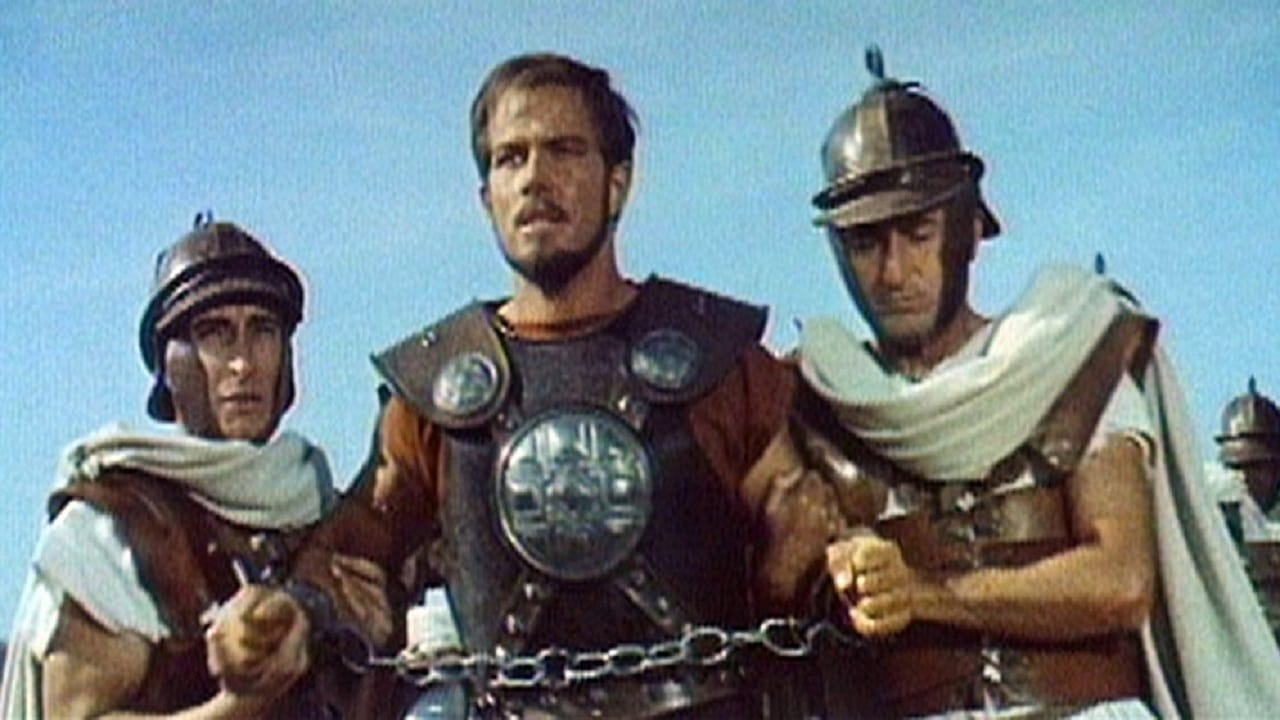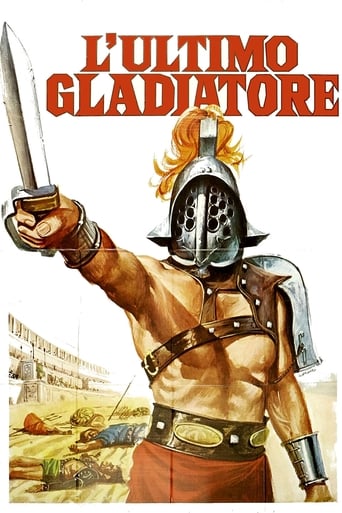StunnaKrypto
Self-important, over-dramatic, uninspired.
ReaderKenka
Let's be realistic.
Kaydan Christian
A terrific literary drama and character piece that shows how the process of creating art can be seen differently by those doing it and those looking at it from the outside.
Edwin
The storyline feels a little thin and moth-eaten in parts but this sequel is plenty of fun.
MARIO GAUCI
I was looking forward to this Umberto Lenzi/Richard Harrison peplum (with the added bonus of Lisa Gastoni and Marilu' Tolo!) of the Roman Empire variety, especially after having been thoroughly entertained by their later collaboration TEMPLE OF A THOUSAND LIGHTS (1965); the setting being the debauched reign of Caligula, Messalina and Claudius (often dealt with in cinema), again, seemed propitious – but the result, alas, is quite lame and often too silly for words! I should mention in passing here that I have at least three more titles relating to these historical figures lined up for the current Easter marathon! Incidentally, despite the U.S. moniker, the star is no relation of the Greek mythological hero – no surprise there, since such catchpenny allusions was a common practice from wily distributors for such indigenous product being exported overseas – but actually the prince of the Britons (read: barbarians)! Indeed, the film's original Italian title translates to THE LAST GLADIATOR – which is itself misleading, since the arena action is neither extensive nor even that plot-centered…to say nothing of the fact that no reference is made at all to Harrison being the ultimate exponent of this violent form of public entertainment! Culled from an Italian Satellite TV screening, the copy I acquired (off "You Tube") is, thankfully, in the proper widescreen ratio and, being in the official language, free of the generally atrocious English dubbing one often has to make do where films of its ilk are concerned. However, this only exacerbates the disappointment one feels watching it, as there is little to hold the attention here (for what it is worth, among those credited with the film's second unit is genre regular Viktor Tourjansky!): not even Gastoni's sultry and openly philandering Messalina (often adopting flashy and cumbersome head-gear, treating assorted party guests to a dance – which the director ungracefully (or, perhaps, mercifully) promptly cuts away from after just a few ungainly moves{!}, conversing and quickly losing patience with slave and rival for Harrison's attentions Tolo while taking a milk-bath – her constant irritation with the latter leads personal whipping and, then, incarceration in a suspended animal cage with descending spikes{!}) does much to liven things up...while Caligula's presence (though predictably capricious and perennially cackling) is too limited and Claudius' too dull (with his actually taking time out from Rome – leaving devoted lieutenant Livio Lorenzon in charge rather than the Empress! – to lead a campaign against insurrectionist elements within the army a doubtful occurrence)!Still, the single most exasperating thing about the film is that the soundtrack is filled with disembodied voices inanely clamouring for something or other – at one point, for instance, female screams can be heard but no woman is anywhere near the location involved – which could well be a penny-pinching tactic on the producer's part to save a composer's fee!! For what it is worth, I have three more of Harrison's efforts set against this backdrop lined up for the current Easter marathon – namely THE INVINCIBLE GLADIATOR (1961), THE TWO GLADIATORS and REVOLT OF THE PRAETORIANS (both 1964), which I now have little hope of their being any better...
melvelvit-1
Italian director Umberto Lenzi carved something of a cult niche for himself with a series of psychological, "bloodless" '60s gialli and a number of '80s horror movies devoted to demons and cannibals but he was nothing if not diverse and also put his peculiar genre-friendly talents to good use in crime films (poliziotteschi), war epics, spaghetti westerns, and even some pepulm. Two of them star Steve Reeves, no less. Another early one, THE LAST GLADIATOR, may not have much directorial flair outside a widescreen battle scene or two but there's lots of plot to help disguise that and although it's not exactly a "thinking man's sword & sandal" (is that an oxymoron?), the mixture of myth and history make it a cut above most peplum pap. Glaucus may have been a "Son of Hercules" (the film's part of a series) but he's also a Celtic prince captured by Caligula during a military campaign in Britain and brought back to Rome to fight in the arena. There he makes a public spectacle of himself wielding a wicked battle ax but when Caligula gives a thumbs down to a prone opponent, Glaucus hurls his ax at the Emporer's head instead and makes a daring escape. Caligula is later stabbed to death by his own kind and Glaucus must match wits with the depraved, ambitious Messalina before winning over the populace and returning to his homeland as King of the Britons, an ally of Rome.Historical events such as Caligula making his horse a senator and Messalina's orgies figure into the story and the beefcake heroics of a chastely-clad Richard Harrison take a back seat whenever Caligula & Co. are on screen, especially Messalina. Beautiful auburn-haired Lisa Gastoni was appropriately imperious and didn't disappoint as the sadistic wife of Emperor Claudius who delights in whipping Glaucus' girlfriend and complains when she can't see the lovers roast because of all the smoke in the drastically scaled down Coliseum arena. The movie's letterboxed and although dubbed, there's some court intrigue in Italian with English subtitles, meaning the movie was cut for U.S. distribution and, hence, dumbed-down. Whitebread Richard Harrison's no Ed Fury (sigh) and his next one, TWO GLADIATORS, shows him off to even less advantage.
dbdumonteil
Albert Valentin ,who co-wrote the screenplay,was one of the most brilliant directors of the French cinema in the German Occupation: "La Vie De Plaisir" and "Marie -Martine" -which featured a "backwards story" long before "memento" .After the war,he was blacklisted and had to content himself with screenplays.All that such a man wrote cannot be completely silly.It's obvious he did not care a little bit about the muscle man (the actor is awful) and his bland fiancée (played by bleached brunette Marilu Tolo)who,most of the times ,work behind the scenes.Certainly the sinful characters ,Messaline and Caligula are riveting and colorfully conceived.When these roles are brought to center focus -which is often-,the movie becomes a delicious camp spectacle.Dig this Messaline's line "that smoke!I can't see them roast!" .It's odd that such an educated man as Valentin could sometimes write such nonsense (it's not legal,given the Church (sic) law!(in 41 A.D.!) ) or make Glaucus -a name borrowed from "the last days of Pompei",which becomes "Hercules" in the French version;it's an Italian /French co-production- the son of the king of the Celts (the Romans called "Gallics")whereas the Gaul was Roman since 52 B.C.Bloody gladiatorial games are the only moments when the hero "shines".Most of the time ,he is overtaken by the events and it is the villains who walk away with the honors,for sin is perhaps more interesting than virtue.Messaline has a (milk?) bath à la "sign of the cross" and dies a la Mankiewicz's "Cleopatra" .What a mess!
mthfllof
I am guessing that there is a series of "Son of Hercules" movies: the theme for this movie is the exact same as that of "Son of Hercules vs. the Fire Demon."A montage of corpses are shown as a chorus of men sing "The mighty sons of Hercules are men as men should be! They took the world and kept the world the sons of Hercules!" Not exactly Shakespeare but hey...at least it's got a groovy beat you can dance to.The narrator informs us this film recounts the adventures of Glaucus, pronounced "GLAW-cuss" (played by a well oiled Richard Harrison) and his struggle with the empress Messalina.In 41 AD Caligula rules the land. In his pointless war against Britain (well played by the Italian countryside) Caligula watches Glaucus the Brit fight. Excited by what he sees (Caligula shows his delight by petting a cat) he takes Glaucus back with him as a slave.Back in Rome (well played by a blurry matte painting) Caligula makes his horse a senator. Messalina, wife of Claudius, watches in horror as Caligula and his midget sidekick laugh at each new outrageous law Caligula enacts. At the Roman games Glaucus fights with obvious skill. The crowd (all 20 of them) yells in obvious pleasure, quieting down when someone makes a statement like "wow, what a man warrior!" Caligula is not impressed, however, when Glaucus throws an axe at him. Glaucus is arrested and Messalina starts a plan to use Glaucus as a means to overthrow Caligula.This production has all the typical Italian beefcake trademarks - bad dubbing, over-acting (in some cases, under-acting), a midget, and men in loincloths. Richard Harrison may not have the biggest muscles but he certainly is the most titillating beefcake actor I've seen. And when it comes to loincloths you have to wonder why his "mini-skirt" is not mini enough. They must not have seen a good thing when they had it, and with too much loincloth neither can we.

